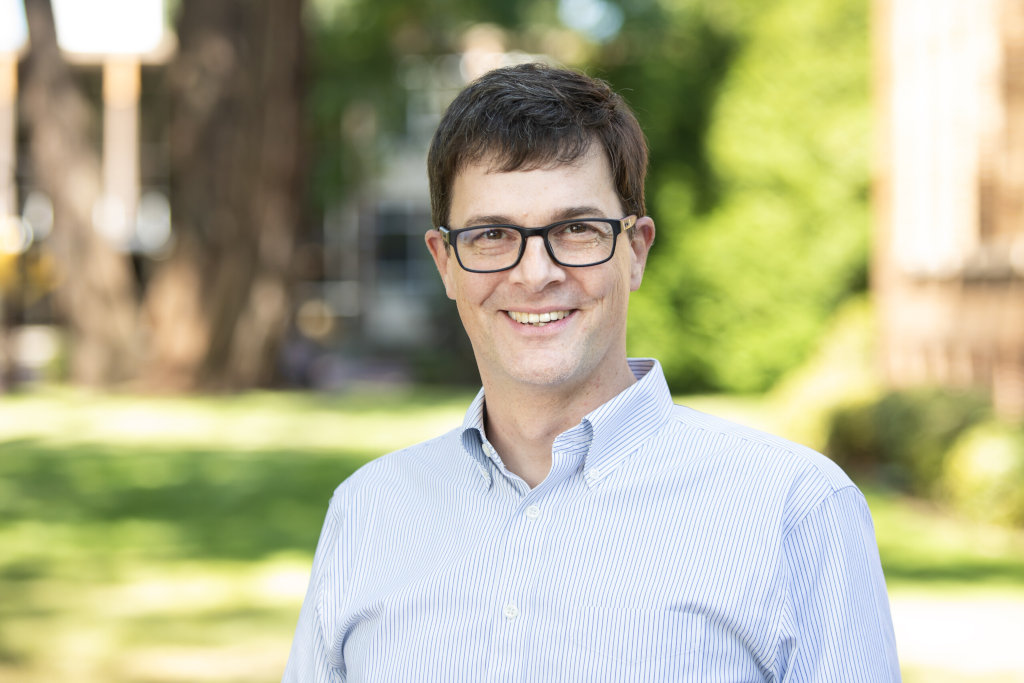Mission House speaker discusses climate change issues
This semester, Alyssa Voigt, a sophomore from New Holstein, Wis., majoring in marketing, is creating content for the Lakeland blog. This is the latest in a series of blog stories she has written.
Kevin O'Brien, Ph.D., professor of religion and environmental studies at Pacific Lutheran University in Tacoma, Wash., recently delivered a thorough and insightful presentation on climate change for Lakeland University's annual Mission House Lecture.
He emphasized climate change's multifaceted problems and the importance of addressing it as a form of violence, specifically structural violence.
O'Brien's research focuses on environmental ethics, climate change and the intersections of ethics, religion, nonviolence and social justice.
Along with his role as an educator, O'Brien has published several books, with some of his most popular including "Meeting the Enemy: The Fossil Fuel Industry and the Power of Christian Climate Resistance, Environmental Ethics and Uncertainty: Wrestling with Wicked Problems with Whitney Bauman" and "The Violence of Climate Change: Lessons of Resistance from Nonviolent Activists."
Throughout his talk, he highlighted recent climate-related disasters, the lack of a national strategy in the United States, identified similarities between climate change and historical struggles against structural violence and delved into the wide array of problems climate change causes.
Some of the most recent climate-related disasters he highlighted included the Los Angeles wildfires and the hurricanes in the southeast. O'Brien highlighted these recent climate-related disasters to show that climate change is prevailing and present.
O'Brien went on to associate the worsening of climate change with the lack of current national strategy. He underlined recent policy changes under President Trump, such as the withdrawal from the Paris Accord on the first day in office, the discontentment of funding to the UN Group responsible for climate change research and action coordination and reduced funding to the National Oceanic and Atmospheric Administration (NOAA) and NASA, which limits climate data collection.
He stressed that the consequences of these policy changes get rid of the United States cohesive national approach to what we are going to do about climate change.
The wide array of problems climate change causes that O'Brien stressed included it being a scientific, human, justice, religious and wicked problem.
Climate change is a scientific problem given the recent climate-related disasters. O'Brien uses examples of refugees in Bangladesh and Wisconsin's current agriculture state to explain how climate change is a human problem since individuals across the globe experience these life altering climate-related disasters that ruin their livelihoods daily.
He explained that it is a justice problem as vulnerable populations, such as young people, people of color and women, are unjustly affected. O'Brien says that it is an act of injustice because "the problems are put more on the people who have the fewest resources to solve those problems."
O'Brien used what he has learned from the late Pope Francis to explain why it is also a religious problem. O'Brien says what he has learned from him is "that we can find resources in religious tradition to deal with hard problems like climate change. And when we are trying to get people to care, care about the state of creation or the state of human beings, religious resources are important partners in that."
Climate change is also a wicked problem according to O'Brien because it is complex and there is no easy solution. O'Brien said that because it has "scientific elements and justice elements and local elements and global elements and all sorts of religious elements climate change is a wicked problem, so we have to come at it from a lot of directions to make sense of the problem."
O'Brien's main idea is that climate change is a form of violence, specifically structural violence. "Structural violence is when the person being harmed is separated from the person doing the harm, by a system, by a structure," he said. This harm caused by systemic structures separates those who suffer from those who benefit.
He continued to explain that everyone unknowingly contributes to structural violence in some way. Even though most individuals are unaware of their role these habitual injustices eventually converge and worsen the problem.
To help explain structural violence, O'Brien noted many past and current figures who represent resistance to structural violence. Past historical figures he named include John Woolman, an abolitionist advocating against slavery; Jane Addams, a social reformer and Nobel Peace Prize laureate assisting immigrants; Cesar Chavez, an advocator for labor rights and protestor for pesticide use; and Dorothy Day, the founder of the Catholic Worker Movement.
Current activists he mentioned include Bill McKibben, a journalist and environmentalist who has worked on building climate movements; and Greta Thunberg, a youth environmental activist promoting intersectional justice and climate change.
He noted these figures who represent resistance to structural violence as examples for people to follow on how people can fix climate change's structural violence. People can take similar action as these figures or use them to understand that all is needed is taking a first step and finding what works.
O'Brien closed his presentation with a call-to-action plan that focuses on two main actions: personal engagement and communication. When he spoke on personal engagement, he encouraged individuals to figure out what role suits them in addressing climate change, whether that be through political engagement, activism, caring for our neighbors, or making personal lifestyle changes.
The easiest advice O'Brien shared is to "talk about it." Simply finding ways to incorporate the topic of climate change into daily conversations opens the discussion for people to admit their feelings and make the topic more prominent in everyday conversations to increase effectiveness towards change.
Learn more by reading one of O'Brien's publications.
